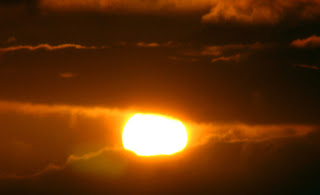
Sunrise, Sunday morning, probably the most sun we'll have all day. Yes, I know I probably shouldn't have been looking straight at it.
I stand on the emergent terrace and take photo after photo, go indoors and do three yoga salutes to it, make a cup of fruit tea, and settle down at the computer. I am alone, save for the dog, and blissfully happy.

The divergence between larks and owls, the keepers of early and late hours, is similar to that between introverts and extroverts, with each side assuming a moral and/or social superiority over the other. I am an introvert lark. Of course there are many shades of personality in between, and I also believe that, while these things hold as general and persistent tendencies, they can vary at different times of one's life, and are more or less valued and encouraged in different cultures.
Extroverts are people-people, party-animals,whom I feel are rather favoured in the world of today. They see introverts as selfish, moody saddos, stay-at-homes and party poopers, who, moreover, shirk their social responsibility by not being willing to be cheerfully available to others at all times.
Introverts, among whom I would count myself, see extroverts as noisy, overbearing, attention-seeking show-offs who take up too much space and feed off other people, and who are pitifully incapable of being self-sufficient. What's more they have more friends than we do, so they are the objects not only of dislike but envy. This does give the extroverts a distinct edge, as they never envy the introverts. It wouldn't occur to them to do so because they don't stop and think or allow any healthy self-questioning into their lives or minds. Now however, I am turning into a bitter, bigotted, morose old misanthrope, which is a perennial danger of being an introvert.

Owls, like extroverts, have more fun, or so they would have us believe. They are awake and in best form at the playful, exciting, after-work, intoxicated times of night which better qualifies them to be party animals too, then lounge in bed all morning like perpetual carefree teenagers whenever they can, or indulge in enjoyable and, as they see it, justifiable grumpiness with anyone who wants anything from them before lunchtime.
There are,indeed, introvert owls. My brother, I think, was, and presumably still is, one. He seemed most comfortable doing his own thing alone, but would mooch about wakefully all night long to do it, then sleep away all of Sunday. An extrovert lark must be a fairly unbearable creature; not only are they up and about bright-eyed and bushy-tailed at an early hour but must needs be bouncing all over other people while they're at it.

But larks have, historically, enjoyed a kind of smug moral superiority; they will catch the worm, grow healthy, wealthy and wise, the hours of sleep they have before midnight are beauty sleep, worth two hours at least of the owl's lie-in. Keeping early hours has traditionally been seen as virtuous, and as such will bring its own reward. I make the most of this officially sanctioned self-congratulation, crowing like my neighbour's cockerel over my slug-a-bed friends who given the choice, would really achieve nothing and get nowhere before afternoon.
As I say, in the world as I see it, extrovert owls, sociable party people, late night carousers, seem to have the advantage. Yet in the world in which I grew up, it wasn't so. In our recent family reminiscences about my father, there has been some amusement about how he would very kindly bring a welcome cup of tea in the morning, then rather offset the kindness by briskly throwing open the curtains so the light was violently thrown into our sleep-fuddled faces. This even in the holidays when there was no immediate need to be up and at it. He was a virtuous morning person! ( My brother's stubborn and exceptional individuality gained him exemption from the rise and shine requirement, at least on Sundays.)
Extroversion was not over-valued either. My mother was an intelligent, sensitive person, with gifts for language and human understanding and a remarkable memory for anything from poetry to the medical and pharmaceutical knowledge from her nurse's training. Sadly her insight into people was not always coupled with tolerance and forgiveness, and her memory also had quite a large capacity for retaining perceived slights and hurts. Much of the hurt, from uneasy relations within her own and unkind treatment from some of my father's family, from fear and uncertainty in the Depression and the War, from opportunity blighted by hardship and simply being female, was real. She was naturally, I would say, quite introvert, loved solitary, quiet pursuits and places, reading, walking, peace and quiet generally, despite having six children. A lot of human contact perhaps grated on her, and she was probably really quite shy, though very socially competent when necessary. In her nursing days too, I think, she had made a few quite deep and worthwhile friendships , forged in shared difficulty, hardship, nitty-gritty, life-and-death, in-it-together times, but which were later dispersed by circumstance. The frothy, lightweight nature of much social intercourse as she saw it later, was unsatisfactory. She peopled her world with her children, and passed on a subliminal message, to me at least, that Out There was rather to be held in little value, mistrusted. This kind of sour grapes misanthropy, that because contact with the outside world is difficult, fraught, sometimes hurtful or disappointing, it is therefore not worth having, is a real danger for some kinds of people, I know. I think my father would have gained more from company, friends, chit-chat, some validation from the wider world, but he was shy and awkward too ( which is not the same as natural introversion; with practice I have learned to be much more socially adept, but am still an introvert at heart), and handicapped by circumstance and upbringing, he deferred to my mother's preferences.
I don't know to what extent these thing are born or made. I wondered if the tendency toward owlishness or larkery might be connected with the hour of one's birth, but very limited and anecdotal research on my part has not borne this out! Of the six of us siblings, we go from the very bouncy upfront extroversion that can't get enough of other people to the downright retiring. I think most of us are fairly adequately well-adjusted, and if not, it's almost certainly the fault of the World Out There!
After an hour or so of solitude, I'll make tea and take it up to Tom, who is larkish but not as much as I am, and probably quite a bit more introvert still. I don't need to throw open the curtains; we have become accustomed to sleeping with curtains or blinds open or absent, and the light joins us in a friendly, gentle way, not as a rude shock. Later, he'll come down for his session of computer-accompanied solitude and meditation, and I, with dog snoring at my feet, will slip into a delectable warm and shallow pool of sleep, a doze which seems patterned with reflected light, sand ripples, and benign, fleeting creatures and personages, but from which the sounds of the ouside world are never quite excluded, and from which I can awake almost immediately alert and ready for breakfast.



 It looks at its best in the light from these main, west-facing doors, which opens out towards the sea and the green fields between, on a summer afternoon. Today they are closed, perhaps because the frescos are fragile and sensitive to light ( flash photography is forbidden ) and we enter by a smaller side door.
It looks at its best in the light from these main, west-facing doors, which opens out towards the sea and the green fields between, on a summer afternoon. Today they are closed, perhaps because the frescos are fragile and sensitive to light ( flash photography is forbidden ) and we enter by a smaller side door.




 The paintings themselves, while illustrating the standard mediaeval Christian staples of death in general and martyrdom in particular, also elicit smiles, and feature many smiling faces.
The paintings themselves, while illustrating the standard mediaeval Christian staples of death in general and martyrdom in particular, also elicit smiles, and feature many smiling faces.










 ... or a little like those mysterious, ancient and inexplicable wood-henges that have been discovered on other shorelines.
... or a little like those mysterious, ancient and inexplicable wood-henges that have been discovered on other shorelines.





 ... preciouses galore.
... preciouses galore.




















